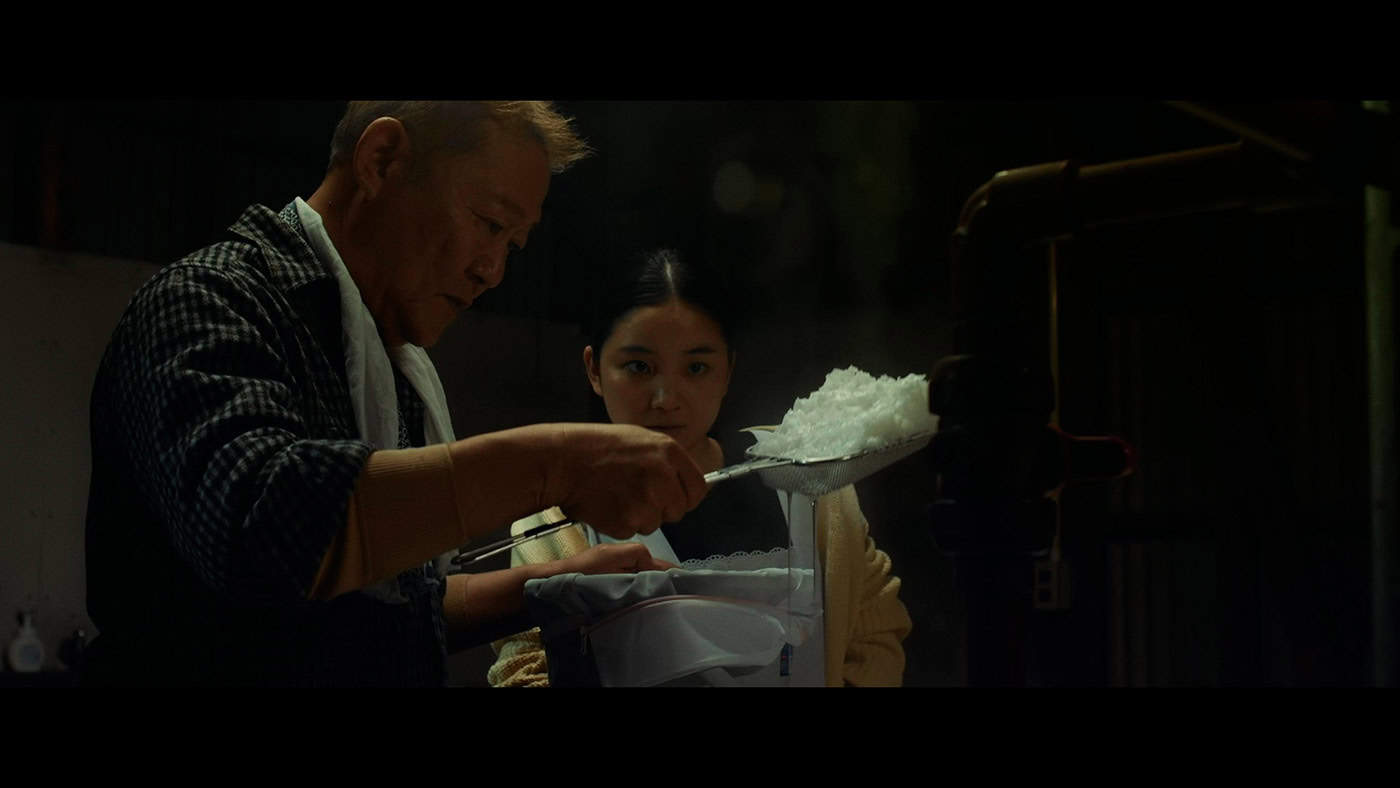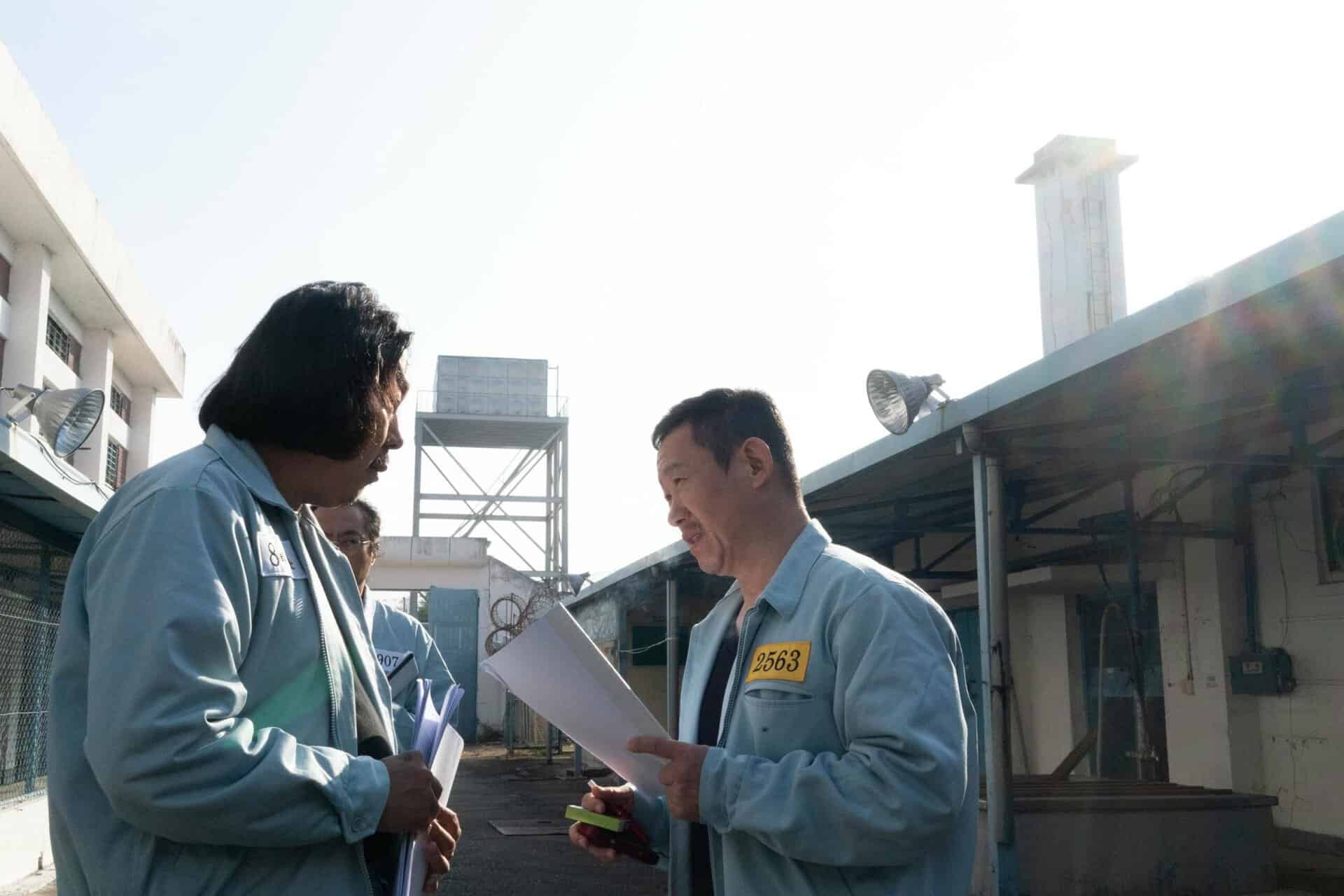Movie Reviews
Short Film Review: Blue and White (2022) by Hiroyuki Nishiyama

Hiroyuki Nishiyama’s telling of Ryusuke and Midori’s journey toward discovery remains poignant but hopeful in Blue and White
Hiroyuki Nishiyama offers his second narrative short film, “Blue and White,” capturing themes close to the concerns of his first film “20 db” (2021) but focusing on the effects of loss and what comes after it. Its brief runtime is a delight to see, from the intimacy of its design to the intricacy of the performances.
The film opens with Ryusuke (Jun Kunimura) starting his day gathering firewood, then cuts to his workshop where he steams seawater to harvest salt. His granddaughter, Midori (Momoko Fukuchi) eventually enters the frame, mumbling to herself why her grandfather is working that morning of her grandmother’s funeral. An attendee of the funeral (Toshio Kakei) asks Midori the same question she was mumbling earlier, hinting that it is disrespectful to the dead for her grandfather to not show his face in the funeral.
What is it about salt harvesting that makes it more important than sending off a loved one to the afterlife? Why isn’t Ryusuke showing his face to the attendees? What is he even feeling that day? He seems like a hard-headed old man who values nothing other than his work. From these questions, “Blue and White” shifts its inquiry to the nature of grieving.
Writer and director Nishiyama explores these questions by depicting the social and personal aspects of grieving where one is invisible to the other. Funeral rites stand for the social face of grieving that Nishimaya presents through particular social conventions: from the temple where each ritual stands for something spiritual to a gathering after where people share meals while remembering the deceased. People wear black on these occasions. Ryusuke, however, is not there to see all these. Similarly, the funeral attendees do not see him witness the ritual, making them think that he may not be taking the whole thing seriously.
What the attendees do not see in the absence of the grandfather is the soul of his work as a paludier. The workshop is his personal space. Arata Dodo’s camerawork brings the frame intimately to the process of salt harvesting and brings us closer to Ryusuke as a person. He is not as closed-shut as the earlier scenes depict him. The workshop is open to Midori with whom her grandfather shares the delicate process of salt harvesting.
Kunimura delivers this shift between the stiff social facade of Ryusuke and the quietly grieving husband with fantastic flexibility. His performance is leveled with his character’s concerns for both the past and the future, making his acting less melodramatic but not lacking in emotional power. Fukuchi, on the other hand, plays Midori with teen-like innocence. Her earlier reactions to her grandfather’s absence have a hint of curiosity rather than annoyance. From how the two main actors depict their characters, director Nishiyama sets the film with different directions for the two characters. For Ryusuke, it is to explore and process grief in his own way, and for Midori to learn more about why her grandfather behaves in that way.
Subscribe to AMP newsletter by clicking on the image below

The film navigates these journeys towards discovery within twenty minutes, a narrative that lasts a lifetime. But this is not just a single lifetime that the film is navigating. While Ryusuke is explaining to Midori the importance of salt harvesting for him and his wife Fujiko, he is pondering both their past and what will it be for the future. This opens a different dimension to grief both as a social and a personal process. While funeral rites operate as a necessary pause to usual social activities, grieving does not stop at the end of the ritual, especially for those who are personally linked with the deceased. Ryusuke does not stop grieving even while working and his grief is deeply linked with his work. He told Midori that for something that has a capacity for life and purification, salt must be made with care. By immersing himself through his work, he expresses his care for his late wife and preserves her memory.
Nishiyama’s telling of Ryusuke and Midori’s journey toward discovery remains poignant but hopeful. Its delicate touch with the theme makes the work emotionally full without the need for heavy treatment, with the help of the great talent of its performers. All of these allow “Blue and White” to thoroughly explore the complexities of grief.

Movie Reviews
Film Review: King of Prison (2020) by Kang Tae-ho

“King of Prison” is an unusual prison film, which combines drama, action and comedy in a realistic package
Usually in prison films, there is a level of exotification, which moves towards violence in the case of the male ones and sex for the female ones. As such, it is always interesting to watch films that take a more realistic approach, with “King of Prison”, although not completely void of crowd-pleasing elements, definitely following this path.
The story is presented through the perspective of Lee Man-hee, a 28-year-old man who becomes a member of a violent crimes cell, after getting caught up in a violent incident. In his cell, he meets the King of the Prison, Beom Teol, who is actually a former gang member in his 50s, who only uses violence when someone from the cell is bullied or in order to break up fights, while frequently giving legal advice to whoever needs it. Wal-Wal, another man his age, is a true character, who is infamous of how much his excrement smells, while the ‘cell ‘room’ also fosters an older guy who was convicted as sexual offender and frequently makes others laugh with his absurd stories, among a number of other ‘characters’.
In general, things go smoothly in the whole prison, until a true kingpin, Jeong Tae-soo is admitted, and decides to take over the role of the King, with the help of the warden. After a series of failed attempts against Beom Teol, he decides to bring in KTX from isolation, a convict who seems to be as good in fighting as Beom-teol.
If you like King of Prison, check also this article
Although there is the occasional fighting throughout, and a finale that moves in the particular path, Kang Tae-ho’s effort mostly focuses on portraying life inside the prison, which is actually dominated by boredom instead of danger. Beom Teol is one of the main sources of this approach, since both in terms of appearance (essentially a middle-aged man with a mustache) and overall demeanor move towards the particular direction, with him rarely actually fighting.
The way even the most insignificant treats of the outside worlds are treated as valuables inside adds another level in the same direction, with the same applying to drugs, homosexuality and sexual release. Particularly the last aspect offers one of the most realistic scenes, with Wal-Wal’s interaction with his visiting wife, and his requests, highlighting the fact in the most eloquent fashion. The friendship Man-hee strikes with another prisoner his age, although with some homosexual connotations, is in the same path. Lastly, the way corruption works inside, through the cooperation with the employees of the prison, cements this approach.
Granted, occasionally the film goes too far, particularly regarding the presentation of defecation, which eventually even becomes part of the action, but in general, the approach is grounded.
Regarding the action scenes, the fact that the main protagonist is a middle aged man does restrict it somewhat, although the fact that the impressive throughout Lee Sol-gu exhibits a sense of danger with every move definitely helps. In general, the whole thing is slow, while the showdown with KFC could definitely have been handled better. On the other hand, one could say that this approach also follows the overall realistic one.
Apart from Lee Sol-gu, the ones who steal the show are Lee Hyun-woong as Wai-wai, the main source of comedy here, and Yoo Sang-jae who portrays a truly sinister villain as Tae-soo. Kim Min as KTX is both good in the fighting scenes and the humorous ones. The cinematography again focuses on realism, without particular exaltations in terms of visuals, while the editing could have been handled a bit better, at least in terms of pacing. It does not harm the film significantly though.
“King of Prison” is an unusual prison film, which combines drama, action and comedy in a realistic package definitely deserving a watch.
Movie Reviews
How to Make Millions Before Grandma Dies: a movie review

(Editor’s note: Spoiler alert: Today’s column contains details that reveal major details in the movie “How to Make Millions Before Grandma Dies,” which is still showing in theaters.)
A mah or Grandmother (Usha Seamkhum) has stomachaches and blood in her stool, but her children do not tell her about having stage 4 colon cancer. This situation, one of several in the Thai film “How to Make Millions Before Grandma Dies,” hits close to home for many Tsinoy, Pinoy and other Asian families, making this comedy-tearjerker a box-office and viral sensation.
Hoping to be the prime beneficiary of her will, the family suck up to Amah, visiting her often and bringing favorite foods. M (Putthipong Assaratanakul), a college dropout, is inspired by his cousin Mui (Tontawan Tantijevakul), who takes great care of her own grandfather and inherits a fortune upon his death. So M decides to move in himself and take care of Amah.
Suspicious of such sudden solicitude, Amah confronts M, who tells her the truth. Amah’s stoicism upon knowing she has at most a year to live, reminds me of my father, who reacted to the horrible news the same way. He had the same disease, though he only had one month with us after diagnosis.
Amah repeats what M says—it is her body, so she has a right to know. When I work with families, some shield the elderly, fearing that they cannot handle the shock of death. I respect this genuine concern, but the older generation are often stronger than we think.
Amah’s three children portray negative Asian tropes. Eldest son Kiang (Sanya Kunakorn), a self-centered stockbroker, does not make time to visit Amah. The film satirizes his aspirations. He sends his daughter to an international school, endangering her fluency in Teochew. I laugh out loud when M reminds the child to greet Amah in her native tongue—most Tsinoy youngsters will likely squirm at this, given their ineptness in any Chinese dialect. Kiang also grandiosely brings Amah to a temple, but instead of praying for her health, he asks favors for himself. When she does not give him her house, he vows not to attend her funeral.
Youngest son Soei (Pongsatorn Jongwilas), an inveterate gambler, steals Amah’s hard-earned baht (she sells congee every dawn). But like any Asian parent, Amah still gives the house to him, knowing that this is the only way he can pay off his debt. In a self-righteous fit of rage, M accuses Amah of enabling Soei, and loving the wrong person.
As a psychologist trained in Western methods, I have to agree that M. Amah enables Soei, fixing his mistakes and never letting him face the consequences. But as a Tsinoy, I know this is part of traditional culture. For most of his life, my father, who worked extremely hard, was disappointed by relatives who asked him incessantly for favors, and he was saddened when some even got mad when they perceived that the others received more. When I asked him why he still supported them, he said he had no choice since they could not fend for themselves. My friends who migrated to the West cannot understand this, but those who are here nod knowingly.
This behavior may taper off, since the younger generations I deal with mostly resolve to prioritize their own well-being, and choose to ignore family entitlement. Whether prudent or not, I do not know, but the film deserves credit for bringing difficult issues to light.
Middle child and only daughter Chew (Sarinrat Thomas), M’s mother, is the most likable of the three, but Amah finds her self-sacrificial mien disturbing. Working a supermarket shift by night and taking Amah to chemotherapy by day is not wise, and when M tells his mother that Amah privately cries over this, the former retorts that Amah never sheds a tear for her. We know that childhood hurts lurk beneath the surface. M offers to act as his mother’s representative and bring Amah for treatment
Filled with Buddhist rituals (Guanyin is my late mother’s favorite goddess, and I confess to lighting incense to her, too) and shot in Bangkok’s Chinatown, the movie resonates true, with a surprise ending that is also bittersweet. No more spoilers—watch the movie now.
Queena N. Lee-Chua is on the Board of Directors of Ateneo’s Family Business Center. Get her print book “All in the Family Business” at Lazada or Shopee, or e-book at Amazon, Google Play, Apple iBooks. Contact the author at [email protected].
Movie Reviews
Cora Bora (2024) – Movie Review

Cora Bora, 2024.
Directed by Hannah Pearl Utt.
Starring Megan Stalter, Jojo T. Gibbs, Manny Jacinto, Ayden Mayeri, Thomas Mann, Chrissie Fit, Andre Hyland, Chelsea Peretti, Margaret Cho, and Darrell Hammond.
SYNOPSIS:
Fearing her relationship status, Cora returns home to win her girlfriend back, but she realizes much more than her love life needs salvaging.

Who knew Cora Bora would be the most triggering film of the year? No, we aren’t talking about the jokes. The comedy did not offend me, but the film surprisingly hit so close to home that it almost felt ripped out of my social media feeds. We all know someone like Cora, brought to life by comedian Megan Stalter.
That friendship can be tiresome and toxic. We struggle with the growing pains as they seek redemption for their past deeds. That’s what watching Cora Bora conjured up, the feelings of watching the awkward comeback of a person from your past, and goodness, it has its ups and downs.
Director Hannah Pearl Utt deserves all the acclaim for nailing this indie darling and walking the fine line of handling an insufferable leading character. And that is not a swipe against Megan Stalter, who plays the role with true conviction and perfection, but it’s a role that asks a lot from its viewers.

In the grand tradition of “I’ve messed up my life and have to return home” dramedies, Cora Bora follows our titular protagonist as they make the walk of shame back home and bring a cloud of chaos with them. Coming off a rough run in Los Angeles, Cora ventures back to Portland to confront what she believes is her long-distance girlfriend, Justine (Jojo T. Gibbs), having an affair…even though they’re in an open relationship.
That exact contradiction is the basis for so much of what happens with Cora that it quickly begins to wear thin on you. Still, Hannah Pearl Utt’s direction and Statler’s performance reel it back at the moment of pure second-hand embarrassment.
That’s not to say cringe and awkward moments aren’t the basis for most of the comedy, as is how the media is geared at this demographic. I just chalked it up to not understanding the chunks of comedic bits I didn’t enjoy in the film, as it sometimes felt super Gen-Z.
Surprisingly, the “drama” is where I felt most of the film’s weight, seeing that Megan Statler had more range than the early parts of the script gave her. A particular monologue from late in the movie rounds out many character choices, even if it would still take me a lot to justify just how much of a headache Cora was early on.
Again, that’s the odd beauty of the film. Hannah Pearl Utt thrusts you into this situation with a realness that makes you look into your life.

Outside of Megan Stalter, no actor or performance stands out. And that’s no fault of the performers themselves. Great talents like Manny Jacinto, Jojo T. Gibbs, and Margaret Cho barely exist to support our protagonist’s journey, so they come off like NPCs in a video game rather than supporting roles.
It’s easy to chalk this up as a vehicle to get Megan Stalter into the mainstream and serve as a comedy showcase, but it would work better if she had better characters to work off of. Take Chris Farley’s Tommy Boy or Adam Sandler’s Billy Madison; both served as essential showcases for the central talents, but they at least knew to surround the lead with worthwhile characters. Even with that, there are small glimmers of what could work, and those actors make the most of them. Jacinto gets the most character development and makes every charming moment believable, even in the most unbelievable circumstances.
Returning to the likability and the grating nature of the film’s tone, it does hamper the overall experience when the characters are contrived or off-putting. As someone who doesn’t like the quirky tone of a Portlandia, it feels like this film is filled with the little weirdos you’d meet there.

Come for Megan Stalter’s comedy, but stay for that powerful monologue. When she eventually wants to leave comedy behind and become a prestige actress, it could be there. Let’s hope she doesn’t hang around in the cringe trenches too long.
Cora Bora is a great starting point for all involved, but it lacks the secret sauce that elevates it from a “Meet This Bright New Talent Movie” to an all-time comedy classic.
Flickering Myth Rating – Film: ★ ★ / Movie: ★ ★
EJ Moreno
https://www.youtube.com/watch?v=embed/playlist
-

 Politics1 week ago
Politics1 week agoGOP releases Jan. 6 clip of Pelosi saying 'I take responsibility' as she discussed National Guard absence
-

 World1 week ago
World1 week agoUkraine reconstruction official quits citing ‘systemic obstacles’
-

 World1 week ago
World1 week agoJury deliberations start in Hunter Biden’s gun trial
-

 Politics1 week ago
Politics1 week agoBiden admin weighs going around Israel to negotiate release of US hostages directly with Hamas: report
-

 News1 week ago
News1 week ago171,000 Traveled for Abortions Last Year. See Where They Went.
-

 News1 week ago
News1 week agoIn attempting to curtail immigration, the U.S. looks for allies in Latin America
-
/cdn.vox-cdn.com/uploads/chorus_asset/file/25485225/Screenshot_2024_06_10_at_11.48.18_AM__2_.jpeg)
/cdn.vox-cdn.com/uploads/chorus_asset/file/25485225/Screenshot_2024_06_10_at_11.48.18_AM__2_.jpeg) Technology1 week ago
Technology1 week agoResident Evil 7 is making its way to the iPhone, iPad, and Mac
-

 Politics1 week ago
Politics1 week agoTrump travels to DC to meet with congressional Republicans, speak with nation's top business executives














